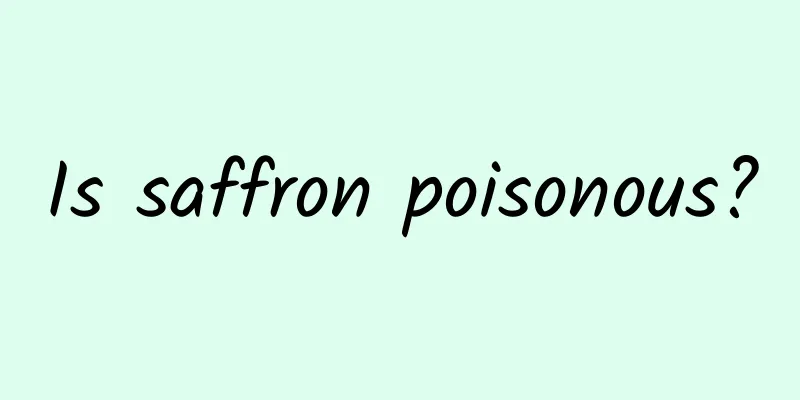Is saffron poisonous?

|
Saffron is a very precious Chinese medicinal material. It has very high requirements for the growing environment. In China, saffron can only grow in extremely harsh and cold plateau environments such as Tibet. Therefore, it is also a very scarce medicinal material. Its shortage also leads to its high price. As the saying goes, medicine is three-part poison. The more tonic a medicine is, the more you should know its contraindications before using it. Many people who have not known saffron are worried. Is saffron poisonous? Saffron itself is non-toxic When it comes to medicinal materials, there is no absolute poison and no absolute tonic. If a medicinal material is used correctly and used for the right symptoms, then it is a good medicine that can cure the disease. However, if a medicine is used in excessive doses, incorrectly, or not for the right symptoms, even the best medicine will become poison. Saffron is sweet and mild in nature and is non-toxic in itself. Many people soak saffron in water and drink it. Saffron has many functions such as improving immunity and beautifying the skin. However, it is a medicinal material after all and needs to be used with caution. If it is used inappropriately and by inappropriate people, it will cause a series of adverse reactions and toxic side effects. Excessive consumption of saffron is strictly prohibited Saffron is a traditional Chinese medicine with a strong blood-activating and blood-stasis-removing effect. It can stimulate the human nerves and blood vessels. The general medicinal dosage is 1-3 grams. Overdose may cause symptoms such as nervous excitement, insomnia, and getting angry. If you take more than 10 grams, you may experience poisoning reactions such as gastrointestinal colic, vomiting, diarrhea, hematuria, and fainting. It is recommended to soak 5-10 flower filaments in water and drink it daily. After adding water about three times, eat the flower filaments together. Pregnant women should not use saffron Saffron has very strong physiological activity and can excite human nerves and blood vessels, especially the uterus. Saffron can stimulate uterine smooth muscles, induce uterine contraction, cause abdominal discomfort in pregnant women, and even cause serious consequences such as miscarriage. Saffron is contraindicated for people with bleeding Saffron has the effect of promoting blood circulation and removing blood stasis, and can stimulate blood vessels. Patients with gastrointestinal ulcers or bleeding who take saffron may cause ulcer rupture and bleeding, or increase bleeding in the original bleeding area, and may even cause massive bleeding. Saffron is not recommended for menstruating women Due to saffron's blood-activating effect, women who are menstruating should not take saffron, as it may cause symptoms such as increased menstrual blood volume and prolonged menstruation. Even women with light menstrual flow should consult a doctor before taking saffron during menstruation, and use the medicine under the doctor's guidance to avoid serious consequences such as heavy bleeding. |
<<: Does saffron treat dysmenorrhea?
Recommend
The bathroom is so small, why is the WiFi signal always so bad?
The bathroom is so small, why is the WiFi signal ...
The first batch of post-95s have already started to suffer from gout...
The pain of gout is enough to make an eagle-like ...
GET! Ancient genes from 6,000 years ago! DNA technology makes ancient people "untraceable"
On September 17, the Wuxi Institute of Cultural R...
The "rain" on these planets is not water, but gems? Or iron?
Plants and animals on Earth cannot live without r...
The efficacy and function of false lychee root
False lychee root is a Chinese medicine that is r...
Three pieces of silk fabrics recreate the shock of the Silk Road!
Spanning 5,000 years, more than 210 pieces/sets o...
The efficacy of dandelion and houttuynia
Various medicinal herbs complement each other, an...
90% of skin problems are caused by something, come and see if you are one of them?
How come my face becomes sensitive? Whenever this...
The efficacy and effects of water hemp
In fact, the occurrence of many human diseases is...
Someone has made a bold assumption about how to destroy the sun. Is this possibility possible?
This article is based on answering a similar ques...
That Day丨It turns out that Yang Liwei flew into space 20 years ago!
20 years ago today A glorious page in the history...
I never expected that | Why do I suddenly not recognize a word after looking at it for a long time?
Review expert: Chen Mingxin, national second-leve...
Is it good for your health to swallow the phlegm?
Expert of this article: Wang Qian, attending phys...
Where is the world's longest existing ancient city wall? Not in Beijing, nor in Xi'an...
The basic exhibition hall of Nanjing City Wall Mu...
Is someone doing infrastructure construction at "Nantianmen"? Netizen: Your workstation and my workstation seem to be different!
What is it like to work in the cloud? Zhao Weixin...









